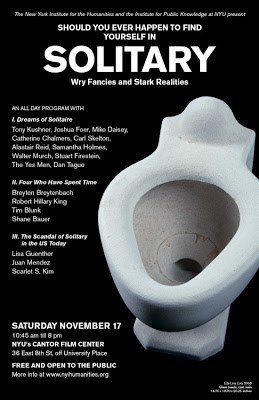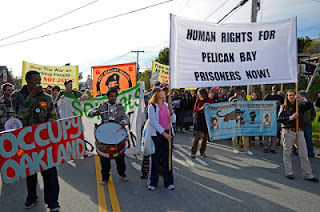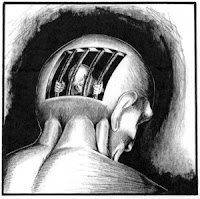Reforming Prison’s Harshest Tactic –The Angola 3 case may help change the...
Primary tabs
Reforming Prison's Harshest Tactic
--The Angola 3 case may help change the arbitrary and sometimes abusive use of solitary confinement.
(The second of two parts)
by Katti Gray
(This article was originally published by The Root on January 30, 2013 and is being reprinted here by Angola 3 News with permission from the author. Click here to read part 1, "Freedom After 40 Years in Solitary?" on The Root website or scroll down to view the full article by Angola 3 News below. Special thanks to Katti Gray, whose articles for The Root are archived here.)
In December 2012 the New York Civil Liberties Union filed a lawsuit to curb the use of solitary confinement in that state's prisons, broadly decrying it as "extreme isolation" that imperils the physical and psychological well-being of inmates on solo lockdown and risks undermining prison safety overall.
Also in 2012, Maine lawmakers -- including a Republican governor considered tough on crime -- voted to formally ratchet back the use of solitary confinement in that state. In addition, Congress hosted a rare special hearing on the practice, highlighting the fact that the United States has no federal guidelines precisely defining when solitary confinement should begin, when it should end and which infractions merit such an added punishment for prisoners.
Prison watchers and reformers, however, say that incremental activity in 2012 does not in itself suggest that the nation is anywhere near a wholesale crackdown on what many deem to be arbitrary decisions about who is placed in solitary confinement. But in Louisiana, where the remaining two members of the Angola 3 are approaching 41 years in solitary confinement, there is cautious optimism.
"It's exactly the kind of movement on this issue that we've been pushing for," said attorney and law professor Angela Allen-Bell of Southern University Law Center. Allen-Bell is a member of Free the Angola 3, an international coalition of attorneys, human rights groups, grassroots activists and moneyed benefactors who are helping to pay legal fees related to the cause of Albert Woodfox, Herman Wallace and Robert Hillary King.
The three black men have consistently held that white officials of the Louisiana State Penitentiary in Angola punished them for organizing an arm of the Black Panther Party at the facility -- and, as self-taught jailhouse lawyers, for challenging systematic rape of inmates, racial segregation and other ills -- by falsely claiming that the men killed a 23-year-old white prison guard in 1972. All three, who did not know one another before Angola, landed at the prison in the 1960s after being convicted of robberies that did not involve physical assault.
 (Flyer from a recent New York City event featuring Robert King and other important critics of solitary confinement.)
(Flyer from a recent New York City event featuring Robert King and other important critics of solitary confinement.)
Hope for One of the Angola 3
Lawyers for Woodfox, 65, say that they expect a favorable ruling in his current petition to be released, which will be heard "any day now" by the same federal judge who ordered him freed in 2008. (State prosecutors successfully appealed to have that ruling reversed.)
But Angola 3 attorneys are convinced that, this time around, they have more emphatically proved the official corruption that resulted in the 1972 conviction of Woodfox and of Wallace, 71, the other Angola 3 member still on solo lockdown.
 (Robert King upon his release.)
(Robert King upon his release.)
King, 69, was released in 2001, after accepting a plea bargain on charges unrelated to the murder. King, who spent 29 years in solitary confinement, was never formally charged in the killing, although Angola officials steadfastly claimed that he was involved.
After Woodfox's current petition for release has been adjudicated, lawyers plan to pursue the release of Wallace, who is diabetic and suffers from what his supporters say is unexplained swelling throughout his body.
"My brother's hearing is bad," Vickie Taylor, Wallace's sister, a retired security guard from New Orleans' Lower 9th Ward, told The Root. "His health ain't so good. Period. He been in there so long, and that makes you feel real bad.
"But he ain't letting prison stop him," she continued. "God fixed it so that he and Albert and King remember everything from the beginning to the end ... And it was told to me by God that this is their season. My brother coming home, baby. I believe that."
 (February 20, 2012 "Occupy San Quentin" protest.
(February 20, 2012 "Occupy San Quentin" protest.
Photo by Alex Darocy, Indybay.)
A Spotlight on Solitary Confinement
Hers is a shared resolve. Other Angola 3 supporters have been fixed, not only on getting Woodfox and Wallace out of prison, but also on spotlighting the impact of solitary confinement on the broader array of people affected by it.
"Crowding, rape, long stints in solitary confinement, beatings and other abuses and forms of torture are not part of the punishment society has condoned. In fact, they are unconstitutional abuses ... precluded as torture by all international standards," psychiatrist Dr. Terry Kupers, a professor at the Wright Institute in Piedmont, Calif., told The Root. He is the author of Prison Madness: The Mental Health Crisis Behind Bars and What We Must Do About It.
"Even if [the Angola 3] had committed the crime for which they are accused," continued Kupers, another Free the Angola 3 coalition member, "the constitutional and legally sanctioned punishment would be time in prison, not torture in solitary."
Written comments that he submitted to the U.S. Senate Judiciary Subcommittee on the Constitution, Civil Rights and Human Rights, which convened a hearing last June on "Reassessing Solitary Confinement: The Human Rights, Fiscal and Public Safety Consequences," noted, among other "psychopathological effects of social isolation," the "obsessive ruminations, confused thought processes ... oversensitivity to stimuli, irrational anger and social withdrawal" of some solitarily confined inmates.
Citing the research of psychologist and lawyer Craig Haney, author of Reforming Punishment: Psychological Limits to the Pains of Imprisonment, who testified in person before the Senate committee, Kupers added: "More than four out of five of those evaluated suffered from feelings of anxiety and nervousness, headaches, troubled sleep and lethargy or chronic tiredness, and over half complained of nightmares, heart palpitations and fear of impending nervous breakdowns ... Well over half reported violent fantasies, emotional flatness, mood swings, chronic depression and feelings of overall deterioration, while nearly half suffered from hallucinations and perceptual distortions, and a quarter experienced suicidal ideation."
Solitarily confined prisoners self-mutilate at rates higher than those of the regular prison population. Once released from prison, they recommit crimes at higher rates, too, according to a solitary-confinement fact sheet (pdf) developed in 2011 by Solitary Watch, an online advocacy news site.
"There is more interest in the subject than there was a couple of years ago. When we started, there wasn't much interest at all," says journalist James Ridgeway, co-editor and co-director of Solitary Watch. "And so far, I don't think the effect of this new interest has changed the lives of these people at all. They are just shut away. Forgotten people -- really, disappeared people. Most of them are people who are permanently excluded. They are never going to come back. And they are in this complete limbo."
According to the U.S. Department of Justice, 80,000 inmates nationwide (more than 2.5 million people are incarcerated in U.S. prisons and jails) were in solitary confinement on any given day in 2005, which is the latest year for which federal data are available. Given that blacks and Hispanics make up a disproportionate percentage of the prison population, they also disproportionately account for those remanded to solitary confinement.
Concerning the Angola 3, the prison's warden, Burl Cain, has affirmed that he would never transfer Woodfox out of solitary confinement and into the general population. "I would still keep him in [solitary]. I still know he has a propensity for violence. I still know that he is still trying to practice Black Pantherism, and I still would not want him walking around my prison because he would organize the young new inmates. I would have me all kind of problems, more than I could stand. And I would have the [whites] chasing after them," Cain told questioner Nicholas Trenticosta, Woodfox's lawyer, during a 2008 court hearing.
Case May Bring Crucial Change
"If we prevail, the benefit will be extended to everyone who is in a similar situation," Trenticosta, of New Orleans, told The Root.
"What happens in Mr. Woodfox's case will be instrumental. It will be crucial," says Parnell Herbert, a New Orleans playwright and Free the Angola 3 coalition member.
Apart from Woodfox's petition for writ of habeas corpus, a civil lawsuit seeking $5 million in compensation for an extended and unmerited solitary confinement has also been filed on behalf of the Angola 3.
The Angola 3 supporters contend that thus far, Louisiana's attorney general, James "Buddy" Caldwell, has been typical of prosecutors who refuse to admit that they made a mistake. (His office would not comment for this article.)
"We're not saying solitary confinement is never necessary. We're saying this is not the way to go about it," Allen-Bell says.
She continues: "The greater issue is one of prisoners routinely in this country being thrown into solitary cells for no infraction whatsoever. They're subject to what I call perception profiling: A woman who complained of being raped [by a prison guard] has the baby, then gets thrown into solitary. People who [are gay] get thrown into solitary. [So do] people who were in gangs when they were in their 20s, have tattoos on their arms still, but they're 35 now and not involved in gangs. This an arbitrary system with no legal criteria for putting people into solitary and no legal means of getting them out."
Says freed Angola 3 member King, now a globetrotting prison reformer whose 2008 memoir, From the Bottom of the Heap, has been revised and expanded: "The broader aspect of this -- and this is what keeps Herman and Albert and myself going -- is that we are just the tip of the iceberg. We have to convince the public of that. We have to let folks know that what's going on with regard to solitary confinement in America is totally reprehensible."
Freelancer Katti Gray specializes in covering criminal justice, health care, higher education and human resources. She is a contributing editor at the Center on Media, Crime and Justice in New York City.
 (Albert Woodfox, left, with Herman Wallace, right.)
(Albert Woodfox, left, with Herman Wallace, right.)











